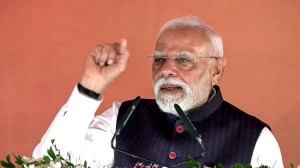D B Patil: The farmers’ leader after whom Mumbai’s newest airport may be named
D B Patil played a central role in shaping the development of Navi Mumbai while championing the rights of those displaced by land acquisition.
 Patil was associated with the Peasants and Workers Party of India, which was a force to reckon with in the 1950s in Maharashtra and was instrumental in making Colaba the party’s power base. (Credit: PWPI)
Patil was associated with the Peasants and Workers Party of India, which was a force to reckon with in the 1950s in Maharashtra and was instrumental in making Colaba the party’s power base. (Credit: PWPI)Maharashtra Chief Minister Devendra Fadnavis on Friday expressed the state government’s intent to name the soon-to-be-inaugurated Navi Mumbai International Airport after D B Patil, a towering figure in Raigad’s social and political landscape. Known for his tireless advocacy for farmers and project-affected communities, Patil played a pivotal role in shaping the development of Navi Mumbai while championing the rights of those displaced by land acquisition.
Zeeshan Shaikh traces the life, political journey, and legacy of Patil and explores why he resonates with locals and the factors that fuelled the push to honour him by naming the airport after him.
Who was D B Patil?
Born in Jasai village in Raigad district to a farmer’s family in 1926, Dinkar Balu Patil grew up in an environment where social activism was important. He undertook his early education in Panvel before completing his law degree in Pune. He returned to the erstwhile Colaba district, where he practised law, before taking a plunge into politics.
His political affiliations
Patil was associated with the Peasants and Workers Party of India, which was a force to reckon with in the 1950s in Maharashtra and was instrumental in making Colaba the party’s power base. His activism and influence meant that after the state of Maharashtra was formed on May 1, 1960, he was given a ticket by the party to contest the first elections in 1962 from Panvel at the age of 36.
Patil made a successful foray, defeating the Congress candidate by over 5,000 votes. He went on to become a four-time MLA, a two-time MP, a one-term Legislative Council member, and was also Leader of the Opposition in the Maharashtra Assembly for a year between 1982–83.
Why Patil resonates with locals in Raigad
As part of the Maharashtra government’s plans to create a twin city across the harbour to address Mumbai’s growing population, the state, through the City and Industrial Development Corporation (CIDCO), began acquiring land in Uran, Panvel, and surrounding villages to build Navi Mumbai in the 1970s-80s. Ever since 1970, when the state government notified that 20,000 hectares of land across 93 villages would be acquired for the development of New Bombay, farmers have been up in arms.
While some land was initially purchased, it led to resentment as locals felt the compensation was far below the market value of agricultural land at the time. Farmers were not only losing land but also their primary source of income and food security. Many feared permanent displacement without rehabilitation. Patil emerged as the face of the agitation, organising farmers into large protests, sit-ins, and road blockades against CIDCO’s acquisition policies, demanding compensation of Rs 40,000 per acre.
Tensions escalated in 1984 when the government attempted to take possession of the 1,147 hectares notified for the Rs 500-crore Nhava Sheva port project.
On January 14, 1984, Patil, the local MLA and driving force of the Save Land Committee, was arrested in Uran. Being a heart patient, he had to be immediately rushed to St George’s Hospital in Bombay. This reportedly acted as a trigger for violence.
On January 15, a gathering of 10,000 farmers approached to present a memorandum to the authorities near Jasai. The State Reserve Police (SRP) opened fire. Over 60 rounds were fired at the crowd, which included women and children. Two people died, and over a dozen were injured. The next day, a similar tragedy occurred at Dastan Phatak, with three more dead and many injured. By the end of January, five villagers were dead, several were injured, and many others were arrested in scattered attempts to resist the acquisition.
The agitation cemented Patil’s position as the undisputed leader of the farmers. He subsequently won the Colaba Lok Sabha elections months later, defeating former chief minister A R Antulay despite a Congress wave. Patil passed away in 2013.
Patil’s significance for project-affected people
Patil’s leadership and persuasive skills led the government to relent, moving from one-time cash payouts to giving project-affected people (PAPs) a share in the development itself. This resulted in the implementation of the 12.5 per cent scheme. For every acre of land acquired by CIDCO, the original landowner or their legal heirs would get back 12.5 per cent of their land, not as raw farmland but fully developed land with roads, electricity, water, and ready for commercial or residential use.
This allowed farmers’ land, once agricultural, to be used for high-value urban purposes. Displaced families benefited from rising real estate values in Navi Mumbai. Many PAPs who initially lost farmland became landlords, developers, or beneficiaries of urban growth. In nodes like Vashi, Nerul, Belapur, and Kharghar, land given under this scheme appreciated exponentially. It is largely due to Patil’s work that locals feel a deep connection to the history, identity, and land struggles of Navi Mumbai and Raigad, which is why there has been a push to name the new airport after him.
The airport naming controversy
Since its inception, there has been controversy over the new airport’s name. While locals have been pushing to name it after Patil, holding rallies since 2000, another section has wanted it named after Shiv Sena founder Bal Thackeray. In July 2022, soon after taking power, the Eknath Shinde-led government cleared a proposal to name the airport after Patil. However, the decision was still considered tentative, with suspicions that the government might not be committed to the naming.
On Friday, Fadnavis expressed hope that the Navi Mumbai International Airport would be named after Patil. A few days ago, the state government sent a proposal to the Union government for this purpose. Fadnavis said he is confident that the Centre has a positive view of the proposal. “I believe we can name the Navi Mumbai airport after D B Patil,” he stated.







